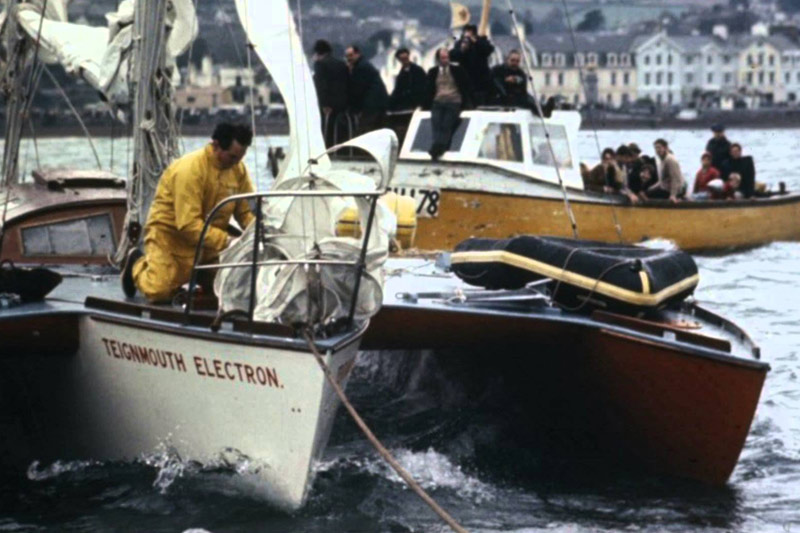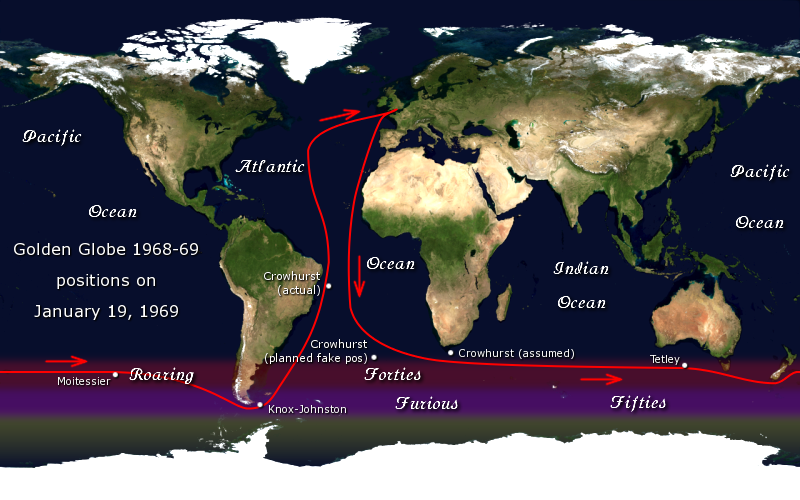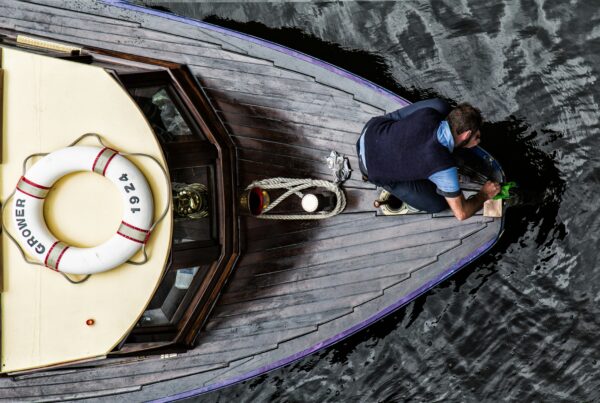Introduction:
Donald Crowhurst, a British sailor, embarked on a perilous journey that captured the world’s attention for its ambition, deceit, and devastating outcome. His ill-fated attempt to sail solo around the world in the 1968-1969 Sunday Times Golden Globe Race became a labyrinth of lies, exposing the fragile state of his mind. Drawing extensively from Nicholas Tomalin and Ron Hall’s book, “The Strange Last Voyage of Donald Crowhurst,” this article delves into the motivations behind Crowhurst’s participation, the meticulous preparations, his avoidance of the treacherous Southern Ocean, the elaborate fabrication of his trip, the overwhelming mental challenges he faced, and the significance of his manifesto in excusing his predicament.

Motivations and Preparations:
Donald Crowhurst’s decision to participate in the Sunday Times Golden Globe Race was fueled by a blend of ambition and financial desperation. Haunted by impending bankruptcy, he saw the race as a chance to secure fame and fortune while proving his mettle as a sailor. His desire to achieve success and provide financial security for his family drove him to enter the competition, despite his limited sailing experience.
Realizing the enormity of the challenge, Crowhurst embarked on a race against time to prepare his trimaran, the Teignmouth Electron, for the grueling journey. Operating on a shoestring budget and under tremendous pressure, he hurriedly readied the vessel for the arduous adventure that awaited him. However, the haste and limited resources left the Teignmouth Electron ill-equipped to withstand the treacherous conditions of the Southern Ocean, presenting Crowhurst with a difficult decision.

Avoiding the Southern Ocean:
In a desperate attempt to catch up with his competitors and make up for lost time, Crowhurst made a pivotal decision to avoid the dreaded Southern Ocean. Renowned for its brutal weather and unforgiving seas, this region posed a grave threat to even the most seasoned sailors. By opting for an alternate route, Crowhurst hoped to maintain the illusion of progress while sidestepping the perils that awaited him in the Southern Ocean.
The Elaborate Ruse:
As the race progressed and Crowhurst realized his inability to meet the expectations he had set, he found himself entangled in a web of deception. Instead of facing the humiliation of failure and the potential financial ruin that awaited him upon his return, he resolved to construct an intricate and deceitful plan. He intentionally sent false position reports to the race organizers, skillfully crafting the illusion of a successful circumnavigation.
In reality, Crowhurst remained in the Atlantic, scarcely venturing beyond his starting point. His deception involved meticulous manipulation of navigation logs and radio communications, ingeniously fabricating a voyage that deceived both the race organizers and his fellow competitors.

Mental Challenges and Desperation:
Alone at sea for months on end, Crowhurst encountered severe mental challenges. Cut off from human contact and burdened by the weight of his deceit, he spiraled into a profound psychological decline. The solitude, coupled with the unrelenting pressure of maintaining his charade, took a toll on his fragile state of mind, pushing him perilously close to the edge of insanity.
Bankruptcy or Death: The Weight of Consequences:
As the race drew to a close, Crowhurst confronted an excruciating dilemma. Returning to England meant exposing his fraudulent voyage, leading to financial ruin and potential legal repercussions. On the other hand, continuing his charade entailed risking his life in the treacherous Southern Ocean. Trapped in this moral and existential quagmire, Crowhurst sought solace in the manifesto he penned.
The Manifesto:
Donald Crowhurst’s manifesto, titled “The Strange Sailing Journey of Donald Crowhurst,” served as a window into his deteriorating mental state and a desperate attempt to justify his actions. Filled with philosophical musings, religious references, and grandiose delusions, the manifesto aimed to cast Crowhurst as a visionary explorer driven by a higher purpose, rather than a desperate man entangled in a web of deceit.
The Impact of the Manifesto:
While the manifesto failed to absolve Crowhurst of his transgressions, it provided invaluable insight into the depths of his despair. Its discovery following his disappearance at sea shed light on the complexities of his motives and the depths of his mental anguish. Serving as a critical piece of evidence, the manifesto enabled researchers and authors like Tomalin and Hall to unravel the enigma that was Donald Crowhurst.

Conclusion:
The tragic tale of Donald Crowhurst serves as a stark reminder of the perils of unchecked ambition, deceit, and the human struggle in the face of insurmountable odds. Motivated by a desire to succeed and driven to desperate measures by financial ruin, Crowhurst’s decision to fabricate his voyage propelled him into a downward spiral of deceit and mental anguish. His harrowing experiences, encapsulated in his manifesto, provide a glimpse into the fragility of the human mind and the profound impact of isolation and desperation. “The Strange Last Voyage of Donald Crowhurst” stands as a haunting testament to the allure and mercilessness of the sea.
Sources: Tomalin, Nicholas, and Ron Hall. “The Strange Last Voyage of Donald Crowhurst.” Hodder & Stoughton, 2016.
We encourage you to use Rabbet to connect with the rest of the boating community! Hop onto our Learn tab to find more articles like this. Join our various forums to discuss with boating enthusiasts like you. Create an account to get started.
Visit us on Pinterest to collect content and inspire others.




